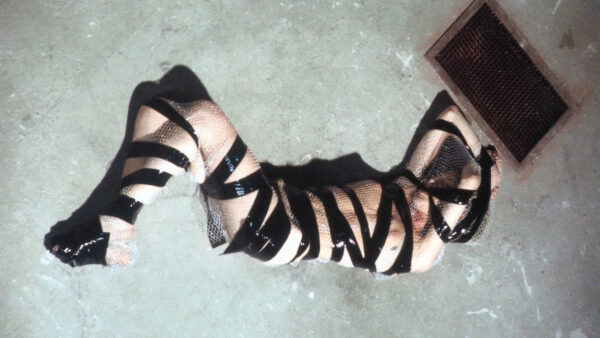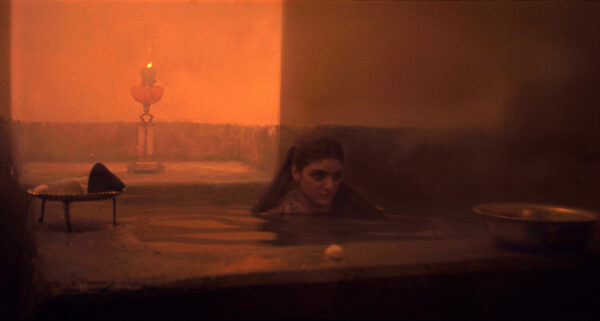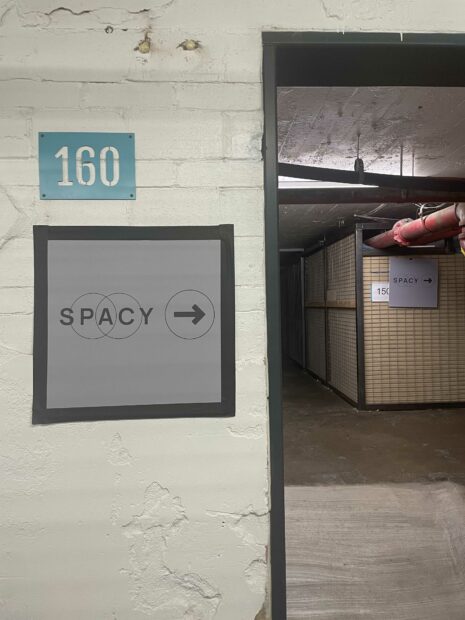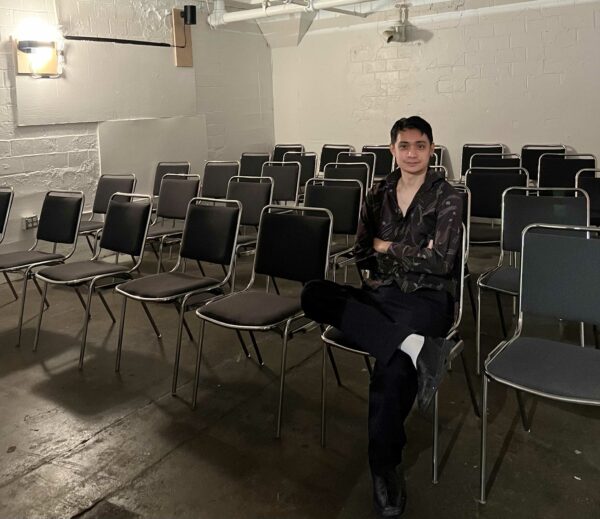In August, Dallas’ first microcinema opened in Oak Cliff at Tyler Station, a new mixed-use development. Spacy, as it was christened by its founder, Tony Nguyen, joins a resurgence of screening houses, like Santa Fe’s No Name Cinema, that offer films selected by people who care deeply for the international underground and have access to limited channels of distribution.
Already, Nguyen has shown new and foundational films one would otherwise never see locally with an audience. He brought queer film historian and programmer Elizabeth Purchell to discuss German gay rights icon Rosa von Praunheim’s rarely seen work in a series called Lovers, Perverts and Transexual Menaces. Japanese farce, Taiwanese futurism, and a feel-good French drama have also been screened by Nguyen. At Spacy, there’s a feeling of lighthearted curiosity as a gateway to enormous cultural movements defined by important films. Nguyen’s choices reflect the way he came to film — by reading theory — which feeds that buried and perpetual dream of simply watching movies with other people.
Back in late April and early May, Nguyen was writing to me about the ethics of a film distribution campaign along the U.S.-Mexico border for the documentary Lo Que Queda en el Camino. He was also signing a lease and ordering 35 conference chairs. I heard nothing about this until shortly before he announced Spacy in July.
“I’m a hard launch type of person,” Nguyen says.
Lyndsay Knecht (LK): Did you specifically focus on Oak Cliff while you were looking for a space? How did you land at Tyler Station?
Tony Nguyen (TN): I think it was really important to keep this venue in Dallas proper. I was in Amsterdam recently, staying with a friend, Sophia [Haid], for a few days, and we were going to clubs, and there was this one called Kanaal40 that is in the heart of the Central District. It’s as central as you can get. It’s downtown; it has the central station so you can really go anywhere in Amsterdam. All the tourists are there; it’s a huge area that’s very busy, because it’s been so gentrified. And Kanaal40 wanted to find a location in Central because they wanted to have counter-programing and reclaim their stake in a city that is ever-evolving. With that kind of programming — centering voices and historically left-out genres that are not generally championed in that area — it was really exciting to see an institution like that, there.
I wanted to create something similar. I wanted Spacy to be in Dallas proper to say: This is a very evolving city, but there can still be counter-culture programming in opposition to what is a rapidly commercial, hyper-capitalist city that is almost exclusively known as a business city. But for me, I just wanted to see more ideas that are people-centered while also unpacking the term “community,” since it’s been commodified to no end. But in all seriousness, I just want to also have fun!
In Dallas, there really is no in-between. I’ve found either 150-square-foot studios or something ginormous that would be like, over 1,500 square feet. In terms of budget, nothing was working in my favor. I was in Tyler Station touring one other space and I wasn’t keen on it. But then the leasing agent was like, “Oh, we actually have another spot, in what we call ‘The Dungeon’ of Tyler Station.” That really piqued my interest; I was really liking the vibe of that.

A still from Oliver Assayas’ cyberpunk-adjacent spy film “Demonlover” (2002), which showed at Spacy on Saturday, September 23, as part of the microcinema’s first collaborative screening with Deep Vellum Books in a series called “Bookmarked Cinema.” Each film was paired with a book available for purchase at the event. The novel “Freeway” by Jorge Enrique Lage was for sale to complement Assayas’ twisted expose.
LK: So where is the money for this coming from, and where might it come from in the future?
TN: Right now all of it is really self-funded, because I work like a billion jobs. I work as the Digital Director at the Viet Film Festival in Orange County, as a programmer at the Austin Asian American Film Festival, as a recruiter for nonprofits full-time, and I work freelance for distribution organizations like Sentient Art Film.
When I looked into grants from the city, there were more that provided opportunities to nonprofits, which limits anyone like myself who wants to create a project and receive funding and not be part of this larger nonprofit industrial complex. Nonprofits have to consider their stakeholders’ interests, which can lead to compromising artistic vision or limiting who they collaborate with. For me, my only interest is the audience at hand.
I’m finding that with the state of Texas, and Dallas as well, [funders are] more interested in supporting filmmakers, which is great. But at the same time, filmmakers also depend on an ecosystem that surrounds them. As with most other micro-cinemas throughout the globe, I always appreciate any donations that come through.
LK: Yeah, for sure. So let’s talk about what you already have on the calendar. I wondered if I should assign any meaning to the first film that you screened at your sold-out opening, Anhell69. It’s like a birth record for the film itself, and it makes me think about how close almost every project comes to never existing at all.
TN: I love that you raised this question. I think there was a lot of weight and meaning in terms of choosing this as my first screening. This film is narrated by the director, Theo Montoya, who plays a version of himself and details the abandoned film project surrounding his friends whom he cast and who died along the way. Anhell69 has this very ominous mood permeating throughout the whole film.
And the director kind of described this film as a trans film — as a film that doesn’t have borders or boundaries. It was unlike anything else I’ve seen in terms of both the form and its messaging. Anhell69 as Spacy’s first screening is intentional in the larger ethos of experiencing cinema’s multiplicity — Anhell69 is a eulogy, a film within a film, a portrait of clandestine Colombia, of longing for safe queer communion; it is a record of collective trauma and shows how this multiplicity, like humans, can push the boundaries of our nature.
I think I’ll just maybe stop there. I’m getting very emotional, just even thinking about it. It tied with other films I chose for August. I’m interested in the diversity of ideas. And supposedly — and really, honestly — a lot of the best ideas come from people of color, but that’s a whole other discussion. People who’ve been historically left out, I think they generally do have the best ideas. But there’s a larger conversation I really wanted to have in terms of the city. A lot of the cultural programming in Dallas carries an emphasis on representational politics. I think there is a time and place for those, but then we’re not getting to these larger discussions of the systems behind these politics, and then you know, what is, like, authorship.
Anhell69 is really about the ownership of queer communities. But then we will also show Nothing But A Man, a film that focuses on Black life in the South, but it’s done by a German white man.

A still from Mohammad Reza Aslani’s murder mystery “Chess of the Wind” (1976), which showed at Spacy on Saturday, September 23, as part of the microcinema’s first collaborative screening with Deep Vellum Books in a series called “Bookmarked Cinema.” Each film came paired with a book available for purchase at the event. “Rituals of Restlessness” by Yaghoub Yadali will accompanied this legendary Iranian film.
LK: It’s one of my favorite films of all time. Abbey Lincoln is so transcendent.
TN: More people do need to see it. Institutions and even individuals are always trying to check a box in terms of what they want to present. And it really leaves out this question of: “Can people address other people from other communities in their work, or people who have different ideas and whatnot?”
And, of course, there are ethics that have to be navigated there, but I think the answer is yes. This idea of speaking near a community and not speaking about the community.
But going back to Nothing But A Man. That film is a beautifully done movie, it’s very visceral. So moving. Some people will distance themselves from it just because it is a white German man telling the story. And they’re like, “We can’t have this type of practice being encouraged” and whatnot. I would disagree, considering the care and research done by [director] Michael Roemer and his crew.
LK: So the funding is coming from you, but what about the work of running Spacy? Is anyone else going to be involved in programming?
TN: Right now, it is just me. I’m trying to feel this venture out. I want to get a general understanding of what the day-to-day is like for a little bit. And then I’ll open it up to guest programming. People who want to do programming or volunteer for this space — that’s highly encouraged. One, it’s less work for myself, but also, film in itself is a collaborative medium. I’m interested in other types of feedback that can be provided for Spacy to constantly evolve. Curation, for me, is not a dialogue only with myself; I think it’s a dialogue with other people.
LK: That salon-style approach, it’s almost like you’re inviting people into your own space. (Reader: he is.)
TN: I hate to say this, but I am actually pro-gatekeeping. [Laughs.] As much as I encourage people to come, I want them to have a general understanding that this is a spot that’s trying to encourage alternative ideas, alternative structures, and alternative methods.
I think it’s all trust. And I think that’s a huge thing. It’s in a very small space. Like, I think trust has to be really embedded in everything. The films I’m playing could be graphic, they could be extremely challenging. So I think there’s trust in that. I want audiences to understand that I’m playing this for a reason. And trust, of course, that there are people out there that they can discuss these films with. I hope that people go to Spacy and then build trust amongst each other.

Spacy is located in what’s known as “the dungeon” of Tyler Station. The entry is in the back of the building next to Oak Cliff Bike Synergy, and visitors who arrive for screenings after 8 p.m. should enter through the Oak Cliff Brewing Company.
LK: It sounds dreamy. In any conversation I’ve had about movies with a larger audience around Dallas, like outside a theater afterward — especially about movies made locally — I’ve felt real tension and sometimes hostility when I’ve tried to share a take. Like, you have to be friendly and uncritical to whatever you’re watching and there’s a social capital involved — like you’re a “patriotic” person for flatly liking the film…
TN: Which, I think, is so crazy in a city like this. There isn’t a microcinema in the Dallas-Fort Worth area, or at least I haven’t seen another one. So I think because of that the stakes are almost higher to bring together like-minded people, and it’s such a small space.
In my biggest, wildest dreams, if a bad movie is being played and people are having a visceral emotional reaction to it, they boo. I would love something like that. I want to have feedback from other people, and for artists, the feedback is only monumental to evolve your craft.
LK: And it’s fun.
TN: Yes, you can have another person to gossip with. That’s the dream. Film is cool, but it’s not the end-all, be-all. It’s not that serious.
LK: Okay, so before we get off the phone, I’m curious about the name Spacy. Is there a story behind the name? Or was that a struggle for you? It seems so natural, I almost forgot to ask.
TN: Yeah, it was a little bit of a struggle at first. I’m not going to lie. When playing video games, I always choose the default [character] because I’m just not a creative person. Like my cat, for example — I kept the name he had when I adopted him.
I originally wanted to name the microcinema something from the video game L.O.L.: Lack of Love. I was trying to brainstorm ideas from subtitles, or even from the game or the score itself. The game was scored by Ryuichi Sakamoto — he was a person that I’ve always wanted to kind of embody. His range was just incredible. People know him for film, for video games; he’s well known for music, and people also know him as an activist. I think that’s kind of how I wanted the space to be known — known to be anything, to play anything.
But eventually, I couldn’t find something that was casual and sexy. I wanted it to sound easy-breezy. I landed on Spacy because it’s the name of a short film by Takashi Ito that I recently rewatched and it sounded cute.
To see upcoming programming at Spacy, please go here.



